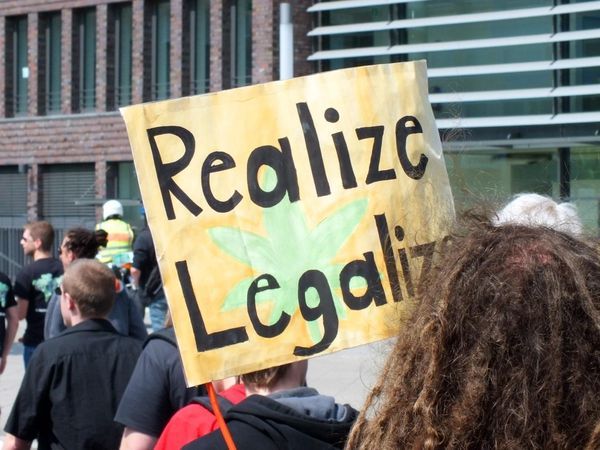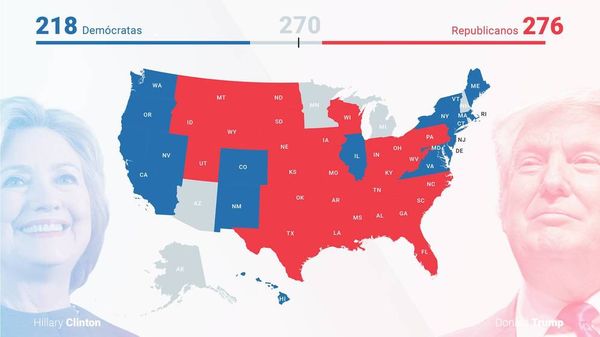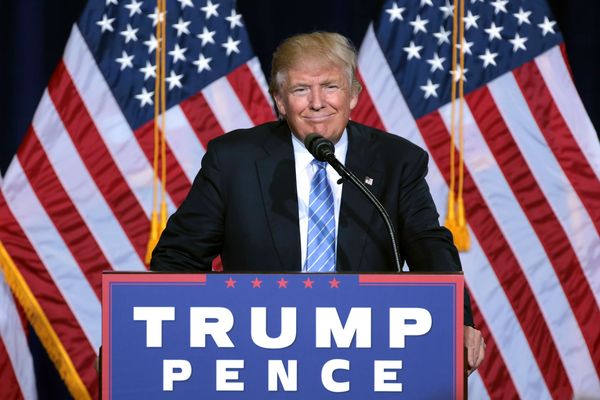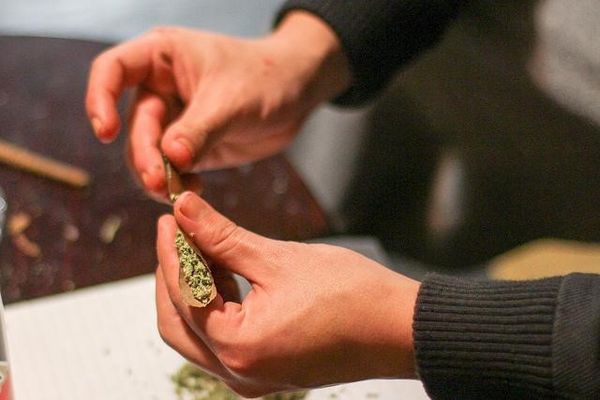- In addition to electing a new president, Americans have just voted different state-level measures that will also usher in important changes.
- Proposals to legalise the recreational use of cannabis were passed in four of the five states where it was on the ballot, including mighty California. Only Arizona rejected the initiative.
- Moreover, its therapeutic use was approved in three other areas, and expanded in another, Montana, where strong restrictions had previously been applied.

On November 9 Americans woke up to the news that Republican Donald Trump will occupy the Oval Office after being elected president in the election held the previous day. But, in addition to this unexpected result, the elections decided other issues affecting each particular state, which included the legalisation of cannabis, whether for recreational or therapeutic use, a field in which there were encouraging changes at the national level.
Thus, nine states voted on their own initiatives related to the consumption of the plant, with different results. Arizona, Maine, Massachusetts, Nevada and California put its recreational use to a vote, opening up the possibility of joining the list of territories that had already taken this step, hitherto consisting of only Alaska, the District of Columbia, Colorado, Oregon and Washington, where cannabis is regulated and subject to taxes, similar to alcohol. The rest of the states voted to regulate only the medical use of marijuana. In total these states represent a total population of 75 million people.

Source: El Confidencial
What is the new president's position on cannabis?
It seems that Donald Trump intends to respect the states' right to legalise marijuana: "If they vote for it, they vote for it" he stated during his campaign. The long-known businessman and now president-elect supported the legalisation of cannabis in 1990, and proposed ending the war on drugs to capitalise on marijuana revenues. In several of the states that just legalised marijuana, Trump actually won.

However, in recent interviews Trump has begun to use more conservative language with regards to legalisation, closer to that of Republican allies like New Jersey Governor Chris Christie, former New York Mayor Rudy Giuliani, and Vice-president Mike Pence, all of whom are radically anti-cannabis. And if Trump decides to place them in positions of power, such as the Department of Justice or Attorney General, there is a very real possibility that they might try to shut down the legal cannabis industry.
Thus, these states ought to worry about their relationships with the Trump Administration, rather than with Donald Trump himself. But let's take a look at the progress on the matter, reviewing the results in the different states:
California: Yes (56% in favour)
Most eyes were on sunny California, the most populous US state, with 38 million people. The measure was actually a follow-up one, as the use of cannabis for medical purposes has been legal in California since 1996.
As the surveys had predicted, as of 12:01 am on November 9, marijuana became completely legal in California (although with fines of $100 for smoking in public). Thus was Proposition 64 passed, which legalised the consumption and possession of up to 28.5 grams of cannabis for personal use, and the cultivation of up to six plants, if private and hidden from view. The approval of the ballot measure, which creates the US's largest cannabis market, came six years after California voters narrowly rejected a similar measure.
But, when will they be able to sell cannabis in stores? For now the measure only allows for the sale of marijuana by state-licensed companies. A deadline has been set – January 1, 2018 – to begin issuing licenses for retail vendors of recreational cannabis, which will pay two new taxes: one applied to crops and another on the sale of the plant and its derivatives.

Massachusetts: Yes (53% in favour)
Proposition 4, which proposed to legalise the use of cannabis for recreational purposes, was also approved in the State of Massachusetts. This measure will allow adults (over 21) to privately consume and plant cannabis without any legal reprisals. The law also sets that the maximum amount that users can have in their possession at 28.5 grams.
The result is also positive for the sector, as it permits the legal purchase and sale of cannabis and its derivatives. To supervise the activity plans call for the creation of a Cannabis Control Commission to oversee the whole process of legalisation and manage specific licenses for those who are going to sell these types of products.
With regards to revenues, the initiative levies a 3.75% tax, in addition to the state's current sales tax; and allows local governments to increase this by an additional 2%. Under the proposal the legalisation of marijuana will take effect in Massachusetts on 15 December – a real Christmas gift for lovers of the plant.
Nevada: Yes (54% in favour)
Another major victory, which means turning Las Vegas into the US's cannabis "Sin City". Individuals over the age of 21 living in Nevada may also, shortly, possess, transport, purchase and consume marijuana in their leisure time without having to prove any kind of health problem in order to do so. Those who live more than 40 km from a certified shop are also allowed to group up to six plants in private areas. Cannabis may not be smoked in public, which will carry a $600 fine.
In addition to the age requirement and the number of plants, another figure coinciding with the measures approved in the previous cases is the maximum amount that the people of this state can consume and transport: 28.5 grams.
In the sphere of taxation, however, the law is a bit tougher, with a 15% tax imposed on licensed growers. The money raised by the Administration through this route will be used to implement the measure, and to support education programs in order to raise awareness about the proper use of cannabis.
Maine: Yes (50.3% in favour)
In what was almost a dead heat on November 8, just a few thousand votes pushed the initiative over the finish line the State of Maine, on the East Coast of the United States, to legalise recreational marijuana use there. And, also by the slimmest of margins, voters passed Proposition 1, an initiative introducing some changes relative to the previous states.
While it set down the same minimum requirement for consumption (21 years), it raised the maximum amount that users can possess and consume up to 71 grams. Furthermore, it states that 40% of the licenses for the cultivation of the plant are to be granted to small farmers.
But perhaps the most striking point of the initiative in Maine was that it made it the only state in the massive US to legalise cannabis social clubs, places where citizens can buy and enjoy marijuana collectively. Maine's law was the first to specifically include them, which could mark a definitive shift in the cannabis industry in the state.
Arizona: No (52% against)
Although bordering on California, the vote in Arizona did not yield the same results: unfortunately, it was the only state to reject the bill, Proposition 205, to regulate marijuana for recreational purposes. The result, however, surprised no one, as this traditionally Republican state has always been very conservative with regards to regulating the use of recreational marijuana.
Florida: Yes (71% in favour)
Many eyes were fixed on this, the southernmost American state, and Florida did not let them down. Although we cannot speak of recreational use yet, the state has approved the legalisation of medical cannabis with the highest percentage of votes in favour in all history, surpassing the 70% who voted for recreational marijuana use in Washington DC two years ago.
Bu not all the news was good. Amendment 2 in Florida is one of the shortest legalisation laws ever passed. It is only five pages long, which means that there are a many details that have yet to be resolved. It leaves all the regulation in the hands of the Florida Health Department, which will determine the limits of possession for the "adequate supplying of each patient."
For example, the new law will go into force on January 3, 2017, and requires patients to obtain certification from a doctor, and then an identification card issued by the state. But those ID cards will not be available for months. The Health Department will also be responsible for issuing licenses for the running of medical cannabis dispensaries.
North Dakota: Yes (63.7% in favour)
In this state bordering on Canada the electorate also turned out to pass the legalisation of medical cannabis consumption, with more than 60% of the vote. The Health Department there now has 90 days to start implementing the regulation, which states that the plant will be distributed at dispensaries for patients, although they can also grow up to eight plants at home if they live more than 40 miles (about 64 kilometres) from one of these establishments.
Dispensaries cannot grow on their premises more than 1,000 cannabis plants, regardless of their growth stages. And they may not accumulate more than 100 kg of marijuana, regardless of its formulation. An opening tax of $5,000 will also be levied on each dispensary.
Arkansas: Yes (53% in favour)
In this state, where the decision was particularly controversial, there were initially two proposals on the table: the Arkansas Medical Marijuana Amendment (restricting the number of dispensaries to 40 throughout the country) and the Arkansas Medical Cannabis Act. The latter also set a maximum number of establishments, but, as in North Dakota, allowed patients who lived far away from them to grow the plant at home. Unfortunately, this more permissive proposal did not make the ballot due to irregularities in the collection of signatures.
As a result, although the result of the vote was positive and the initiative approved, the Medical Marijuana Amendment imposes strict limits on the use of medical cannabis for the sick.
Montana: Yes (56.9% in favour)
The administration of cannabis for therapeutic purposes has been legal in Montana since 2004. However, unfortunately for patients, various court decisions have gradually introduced limitations on consumption by patients (distributors could only provide it to three different users), leading to the closure of many clinics last summer.
Fortunately, the state voted to expand its medical cannabis programme, thanks the support of one in four citizens. In this way Proposition 182 passed, which states that marijuana dispensaries can reopen, after their closure last August, and doctors may prescribe the use of the plant to more than 25 patients a year without being penalised.

And now, what will happen?
Although all the steps being taken appear headed in the right direction, there are still limits that hinder the progress promised in the states. Cannabis is still considered an illegal substance at the federal level. The barriers particularly affect the economic sector surrounding marijuana, as the federal government strictly prohibits commerce in the plant and its products between different states, even if they have approved this activity within their borders.
However, the measures adopted recently have given rise to a territorial block on the West Coast that includes the powerful California, now permitting the recreational use of cannabis. As noted by Gavin Newsom, California's Lieutenant Governor, this fact may constitute a new opportunity for the states that have legalised this type of consumption, so that they can "coordinate and collaborate" and even pressure Washington to soften the federal ban.
Although the presidential results were a disappointment to many, both inside and outside the country, the achievements in the area of cannabis legalisation were considerable. There are now 29 states that allow medical cannabis, and 8 that permit its recreational use, figures that have steadily grown in recent years. We hope that this trend will continue. The position that the new president will take on this matter remains to be seen, which will also shape the near future.



Comments from our readers
There are no comments yet. Would you like to be the first?
Leave a comment!Did you like this post?
Your opinion about our seeds is very important to us and can help other users a lot (your email address won't be made public).